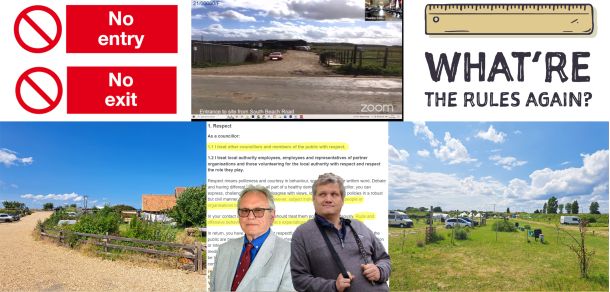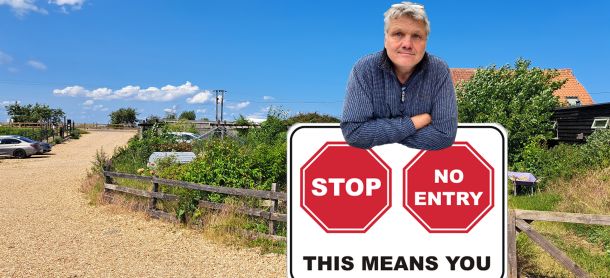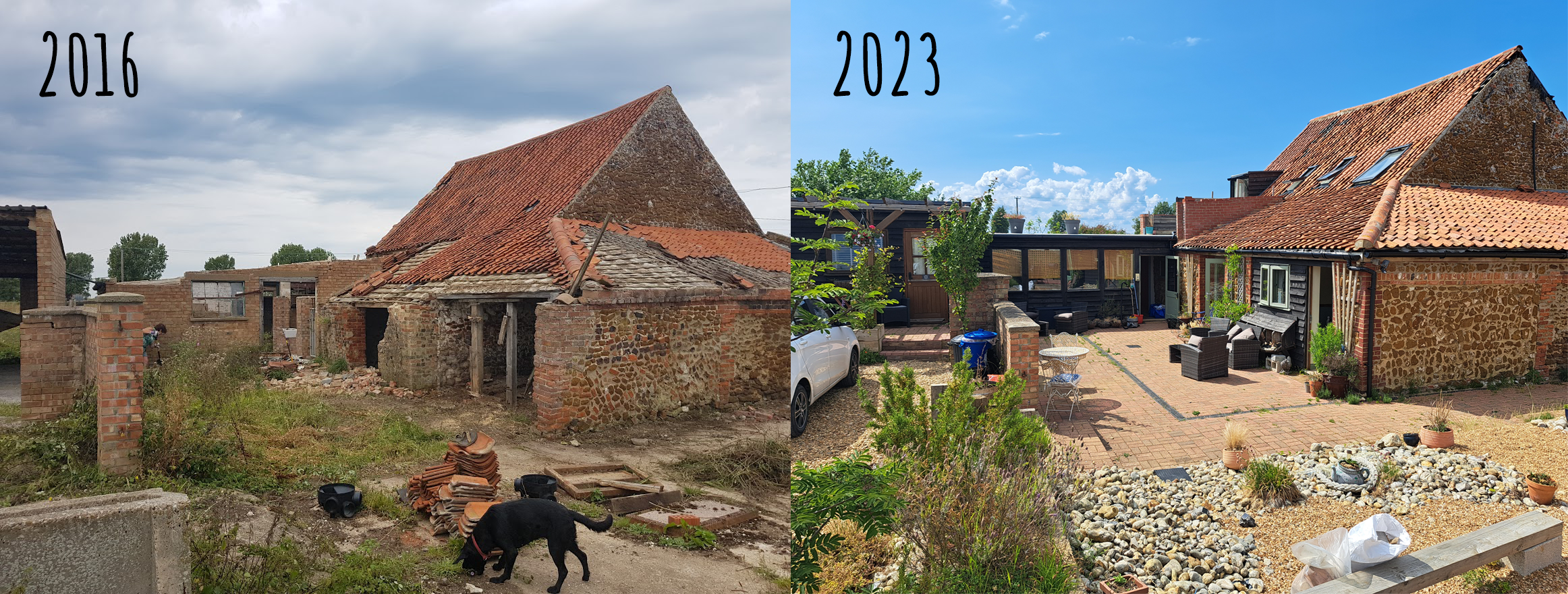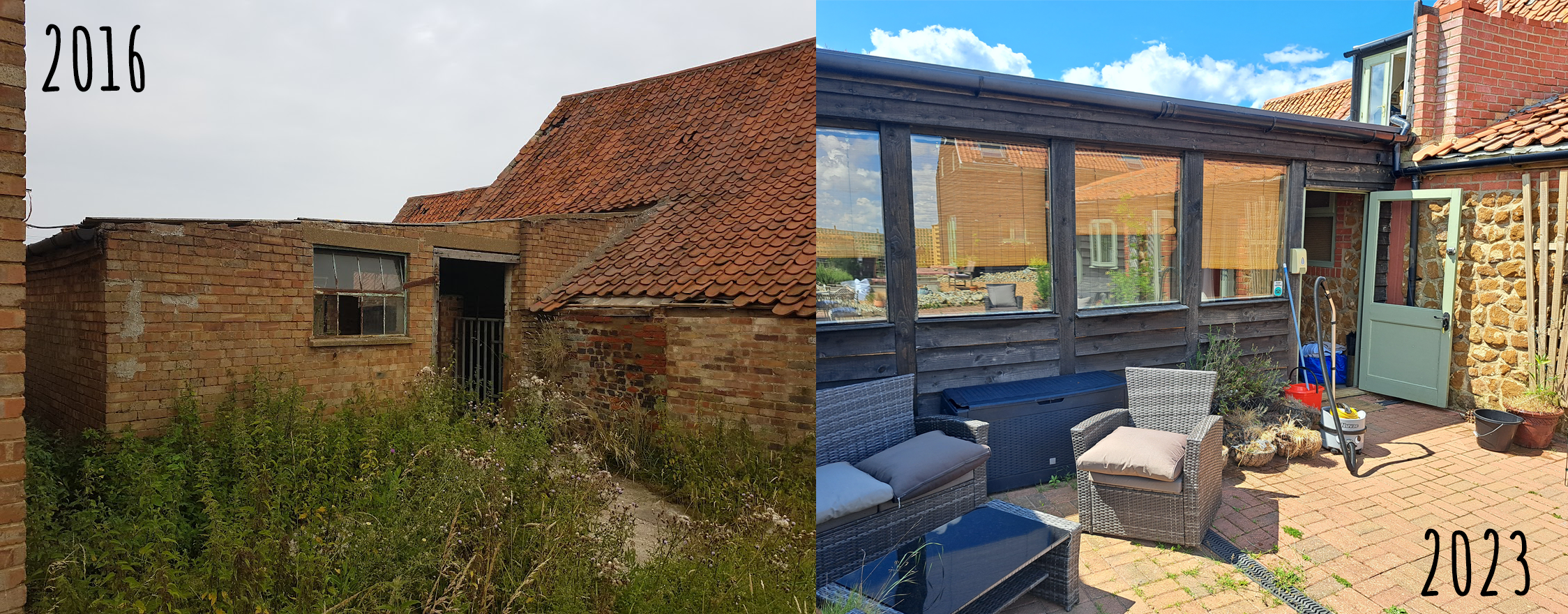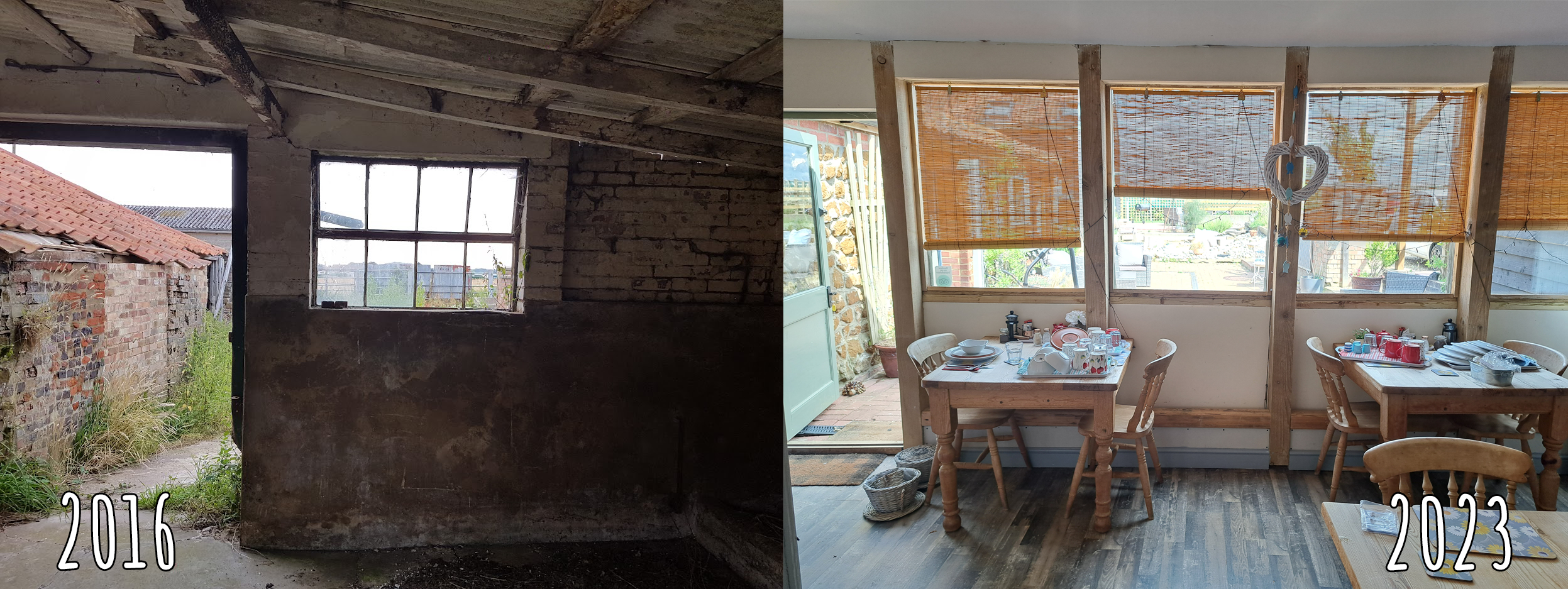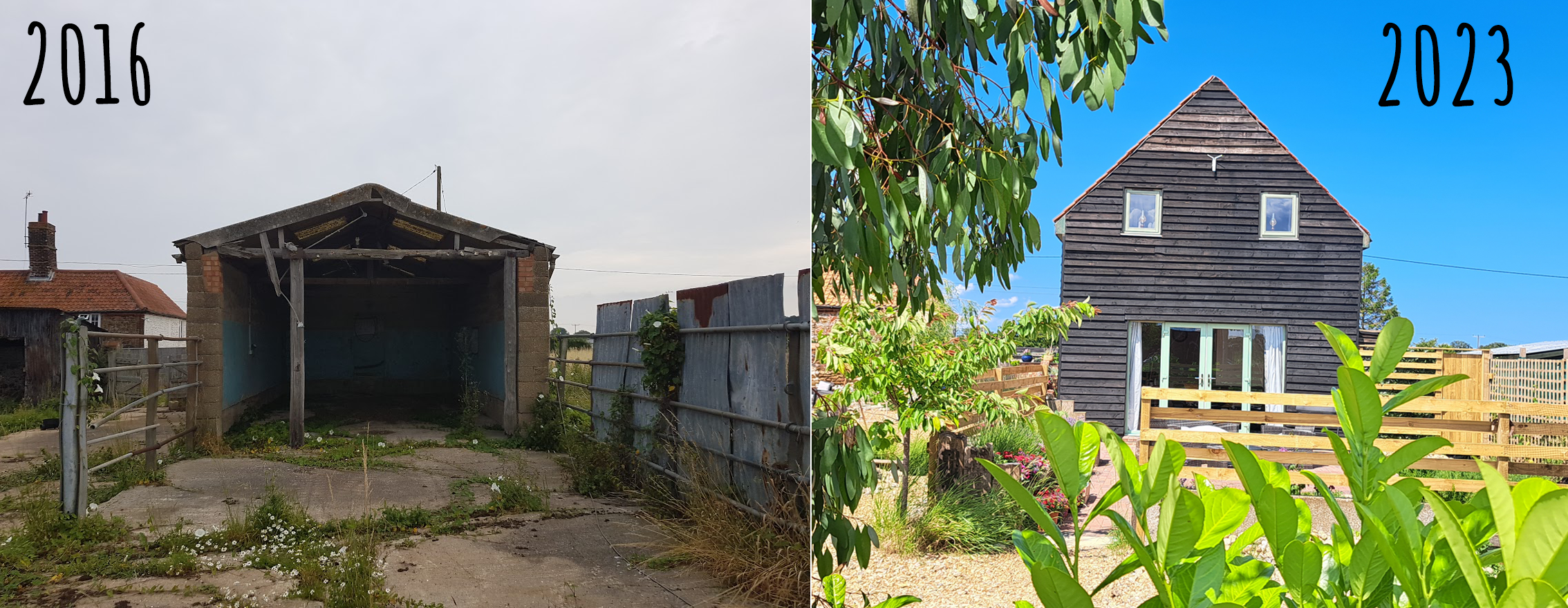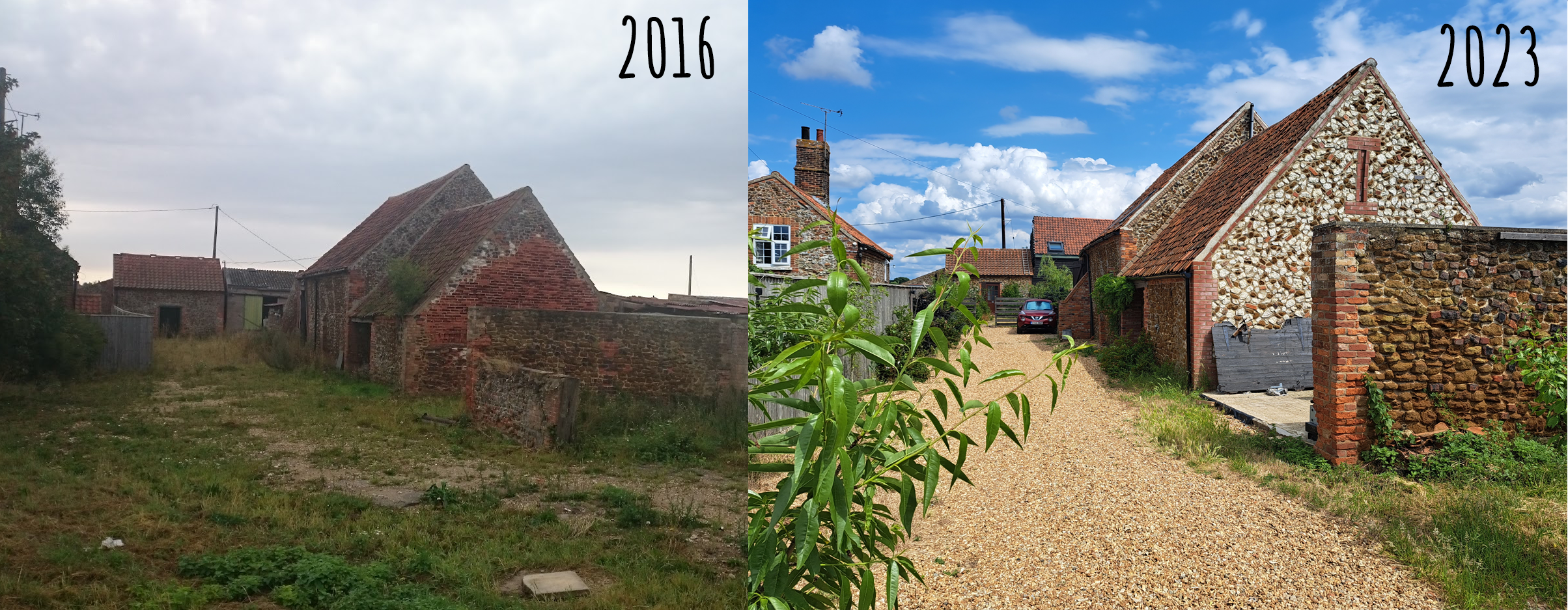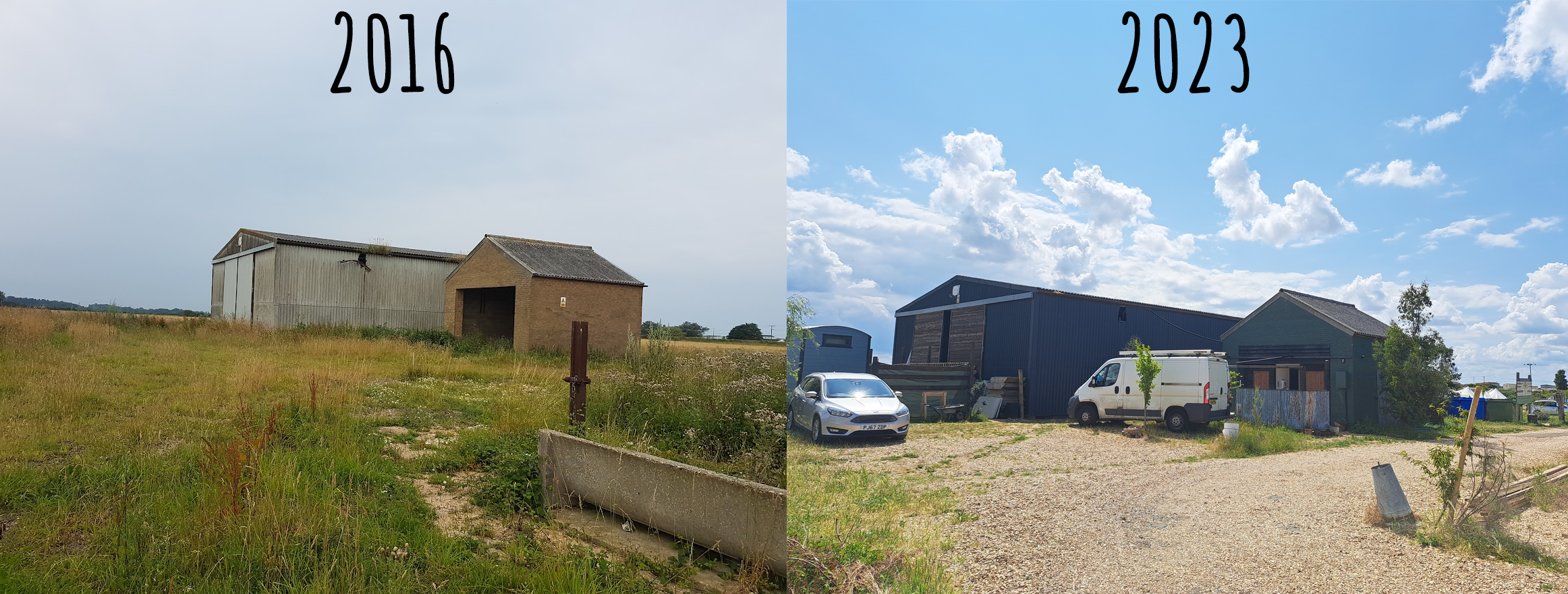Camping and Caravan Site Enforcement
A caravan and camping site,
not a permanent campsite
I acquired the dilapidated old buildings at Heacham with planning consent to turn them into three holiday homes by the beach. Nice little retirement project, I think to myself.
2017 - As cash flow became tight, I opened up a short-term summer pop-up campsite. The legislation states you can run a campsite (or anything else on your land) for 28 days with few limitations. We have a 2-acre plot of agricultural land but no cows to graze on it, so obviously I move forward to let it out to campers who want to camp on sunny days by the sea. To my surprise, I was inundated with guests in that season but found limitations on what I could operate in that 28-day period in August 2017.

Being so close to the sea makes the site perfect for an August campsite, when the weather's nice and people want to go to the beach
Permanent Campsite
2018 - I investigate the possibilities of becoming a certificated location with an umbrella company like Freedom Camping Club, Caravan and Motorhome Club, The Camping and Caravanning Club, or The Greener Camping Club. These allow you to be associated with them and obtain a certificate of operation.
Unfortunately, I was unable to obtain these for the 2018 season, so continued to operate under 28 day period. I was, at this stage, somewhat naive in the operation of campsites, and in some cases the scary people that attend campsites (alongside the otherwise more amicable and pleasant people).
At this stage of our usage, it was truly a barebones campsite. There was 1 toilet which was a chemical toilet, half the field was covered in thistles, and the fence often fell down, so guests woke up to the neighbour’s cows wandering around tents first thing in the morning. I believed we could only use a 10-metre plot along the side of the fence as the vast majority of our field was covered by Article 4 restricting our usage (I believed).
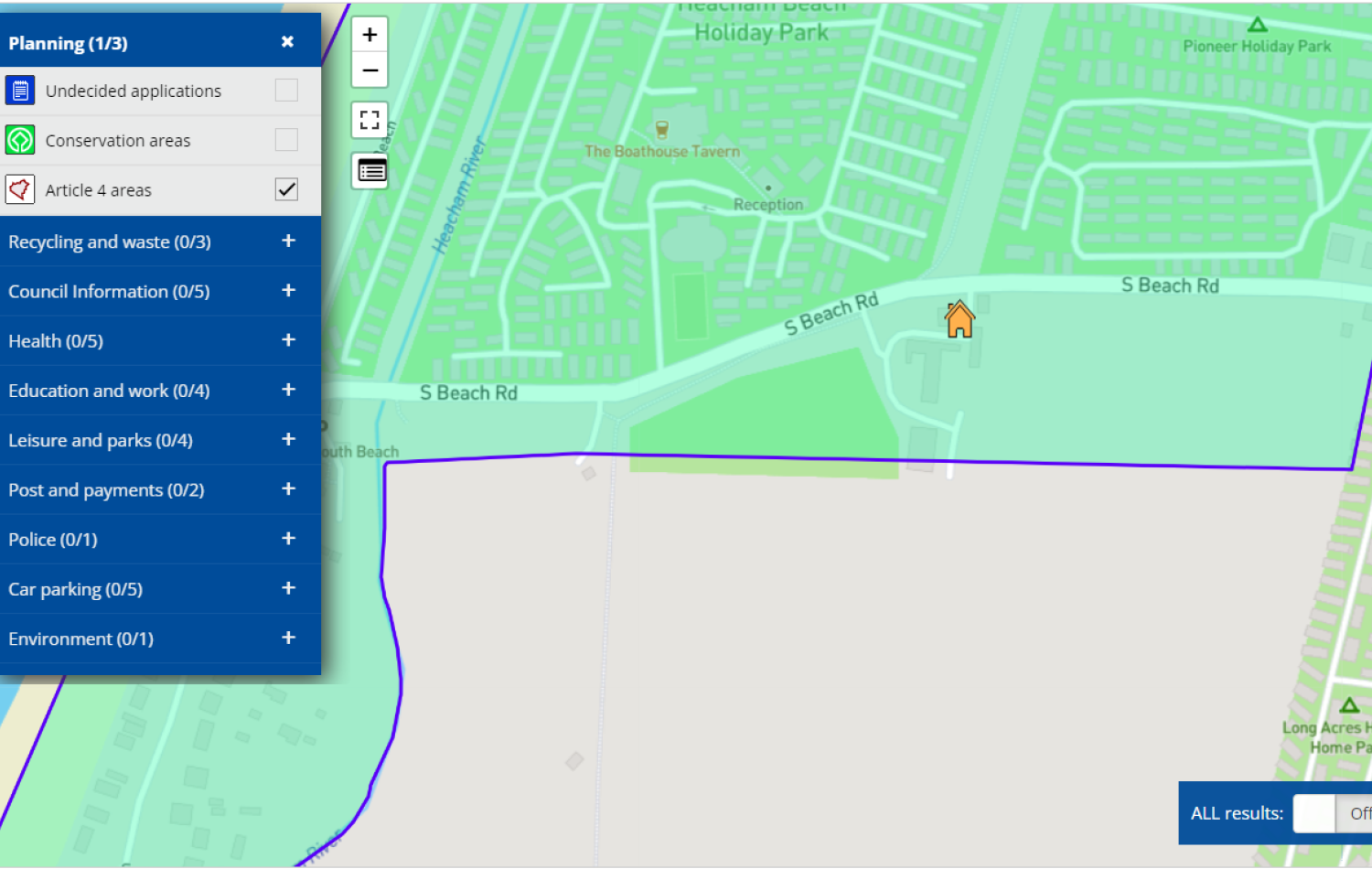
Official maps show that Article 4 usage doesn't apply to the southernmost 10 metres of the site, so while I still thought that the whole site was subject to Article 4, I only used this stretch of land

We ultimately got certification from The Camping and Caravanning Club at the end of August 2018
First Complaint
On a very rainy summer’s day, a customer had paid £8.50 to stay at the campsite for her, her husband and 3 children. She became quite negative about the experience between the bare basics campsite, wet and very windy weather, and getting themselves stuck in a boggy campsite field. Unfortunately, the negativity was far too much for me to handle based on what I felt was a very minor fee to charge. I politely advised they need to get themselves out of the field and refused to entertain any more discussion that it was my responsibility. Looking back, this was probably my error but, hey-ho, we learn by experience!
Luckily the customer did get themselves out but then went on to complain to the council about the campsite being non-adequate as a public facility/commercial facility. Throughout this season we were developing improved toilet blocks in the internal of an agricultural building where we were only using the internal to house some flushable toilets, washbasins, and showers (this is non-operational development and should not require planning consent as it is a permitted development use, not that I knew then as much as I know now).
So, the Environmental Quality Officer does a spot visit on us complete with clipboard and nametag, and makes notes on different issues which they come across. The odd cement board laying in the gravel becomes a toxic asbestos fibre board which could destroy the world, I felt was the point of the officer trying to make. The site was, at this stage, under development and as such there were building materials and tools which I was advised had to be fenced off to avoid members of the public falling into cement mixers. I believed I’d said yes and no in the correct areas and helped to satisfy the inquisitiveness of the officer.
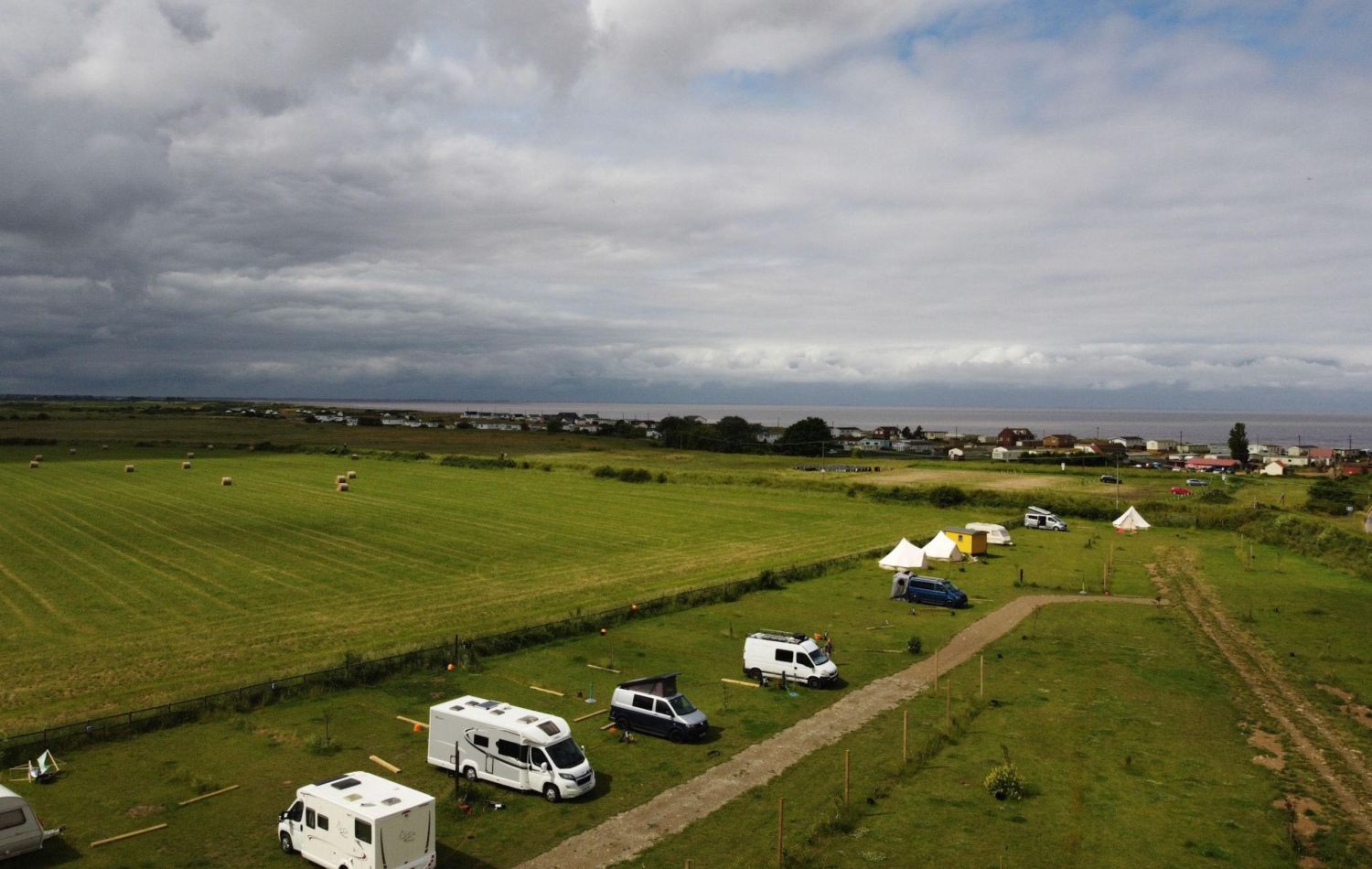
This site has undergone a lot of work since I first acquired it in 2016
Enforcement
Unfortunately, a few weeks later I received an email from Enforcement Officer Heidi Wedge that the Environment Officer advised I had developed a toilet block and in doing so had made permanent infrastructure, therefore making my 28-day campsite into a permanent campsite, which was unlawful as it extended beyond 28 days
Naïvely, I believed the Environmental Quality Officer, Heidi Wedge, and her manager Matthew Clarey knew what they were talking about, and were trying to guide me for the benefit of my business and the community; to limit breaches of law and keep society running smoothly without consumers and small business managers hitting too many confrontations of views.
I was wrong.
Planning Application
The email gave me two options: either I apply for planning consent for a permanent toilet block and a permanent campsite approval or I demolish the toilet block. At this stage, I’d done a bit of research and had obtained a certificate from The Camping and Caravanning Club to operate a caravan site within the plot. Although this wasn’t a subject I was hugely knowledgeable about at the time, I was learning more about it as the months went on. So, I applied for a Temporary Campsite. At this stage, my thought was: “How difficult can it be?” I’m in a poor agricultural field of just 2 acres, it’s right by the beach 200 yards away, I’m surrounded by static caravans and seaside cafes, and historically the plot of land had been used for camping by farmer Thomas Raines, who applied for water for his campsite in 1934 and became a shelter for campers in the great flood of 1953 serving as a high point from floodwaters. I thought the likelihood of the council approving was good.
The planning application was refused for two reasons:
1) The location and point of entry were allegedly within a flood risk zone, despite the surrounding land shielding from floods as far back as 1953 and the campsite itself being raised.
2) The point of entry/exit was not approved by Norfolk Highways as the neighbours had built an unlawful 2-metre fence along the road, and an Environment Agency hazard sign by the side of the road blocked visibility.
On refusal, I looked into sorting these issues and improving those facts.
The Environment Agency reviewed the flood risk at the point of entry and decided I was correct. They then amended the flood risk at entry/exit. Visibility was improved as the flood risk hazard sign placed by the Environment Agency that was blocking visibility was removed.
August 2019 - We received an enforcement notice giving us 3 months to remove all infrastructure. Which I interpreted as being the toilet block, which, of course, meant demolishing all that we had built. As the enforcement notice gave us 90 days to comply with their instruction, we immediately applied for planning consent for the toilet block.
This time I did my research and we obtained planning consent 3 months to the day for a toilet block. I now know as an older and wiser man that pre-approval development agricultural buildings would have given me permitted use rights from day one. Unfortunately, I didn’t know this at the time and unfortunately, I now know that the council (despite my understanding of how government operates) are not there to encourage young signpost businesses, nor to achieve a result in a proactive, non-biased position.
July 2020 - Just when I thought it was all over, the enforcement officer reappears in an email asking about whether we have removed infrastructure from the site. I explain we now have planning consent for the toilet block and now operate a certificated location. She advises, notwithstanding that info, that we still have enforcement notices still to be resolved. At this stage, I broke off communication because I felt that she was peddling utter nonsense and not progressing the case in any meaningful way.

With this, we got planning permission to build the toilets, just not use them for commercial use
Covid
August 2020 - Deep in the year of COVID, and we are very busy. There’s control of demand with increased prices, customers are very nervous about Covid, and we’re having to implement lots of cleaning regimes. The Government writes up documentation to the country to tell local governments and councils to be lenient with tourism and not pursue enforcement. Despite that advice, enforcement turns up, takes photos, and claims I’m in breach of this, that, and the other.

Tourism is a vital income for coastal areas

In 2020, we were operating as a camping and caravan site under The Camping and Caravanning Club's certification
September 2020 - Another enforcement visit, again gathering information on my usage and how I may or may not have infringed on it. I expressed that I’m no longer a temporary or permanent campsite, I am a certificated location with the Camping and Caravanning Club. At this stage, she believed I exceeded my occupancy, at which I acknowledged I was operating under the limitations of the Camping and Caravanning Club, and was simultaneously operating under the COVID 56 days camping legislation, therefore NOT exceeding my allowance and being perfectly lawful in my operation. However, she didn't enforce against me for a camping and caravan site, she enforced against a permanent campsite. I explained that throughout the Covid period, permitted development for camping extended to a 56-day period, and since I undertook camping alongside the fence (which is outside Article 4) this means I had unlimited camping during the Covid period. Any vehicles on the site are based on a Camping and Caravanning Club Planning Exemption and are therefore allowed to be placed anywhere on my site (during this date range was 5 caravans and 10 tents).
Criminal Enforcement
2021 - I receive enforcement procedures to go to court for criminal enforcement due to the “continued use of a permanent campsite and refusing to follow the conditions of enforcement regarding the use of infrastructure”. At the hearing, the Enforcement Officer shows numerous exhibits on all the items that she believes strengthen her point of view. On all key points, the details of enforcement are a fictional wishlist rather than an unbiased gathering of facts. Correspondence with the council’s legal department proved non-proactive and non-productive, so I engaged the services of Birketts Legal. Birketts reemphasised the importance of the position that a campsite is a different legal entity from a caravan site and gave me chapter and verse of case law for me to understand and quote in more persuasive discussions. After thousands of pounds spent on legal advice and attending magistrates courts on numerous occasions, the council agreed to accept a new planning application.
2nd Planning Application
This application was submitted and the application was for a caravan and campsite (regulated by the local authority rather than the existing one regulated by Camping and Caravanning Club). This was based on the fact that my fallback position was a caravan and campsite which had been in existence since 2018. As such, this was not a new application, this was a retrospective application for my existing permitted development usage of a Camping and Caravanning Club site (exempt from local authority planning). In obtaining that, my hope would be the council would understand that I do not operate a permanent campsite and that the infrastructure in question (toilet block) on the enforcement does not need to be demolished.
The application was refused by the planning department on the following points:
Unfortunately, after carefully considering this application, the LPA concludes that the site does not benefit from exemption regardless of the certificates that have been issued.
The General Permitted Development Order, 2015 (as amended) states at Section 3: ‘Subject to the provisions of this Order and regulations 75 to 78 of the Conservation of Habitats and Species Regulations 2017 (general development orders), planning permission is hereby granted for the classes of development described as permitted development in Schedule 2.’
General Development Orders - 75
It is a condition of any planning permission granted by a general development order made on or after 30th November 2017, that development which:
(a) is likely to have a significant effect on a European site or a European offshore marine site (either alone or in combination with other plans or projects), and
(b) is not directly connected with or necessary to the management of the site, must not be begun until the developer has received written notification of the approval of the local planning authority under regulation 77(approval of local planning authority.)
General Development Orders - 78
(1) The local planning authority for the purposes of regulations 75 to 77 is the authority to which an application for approval under regulation 77 would fall to be made if it were an application for planning permission.
(2) The fee payable in connection with an application for such approval is £30.
(3) Approval required by regulation 75 is to be treated:
- (a) for the purposes of the provisions of the TCPA 1990 relating to appeals, as approval required by a condition imposed on a grant of planning permission; and
- (b) for the purposes of the provisions of any general development order relating to the time within which notice of a decision should be given, as approval required by a condition attached to a grant of planning permission.
Understanding the reason for refusal
I understand sections 75 to 78 regarding the conservation of habitat species regulation 2017. In fact, I got caught up in this subject matter 2 years ago and found myself in high court backpedalling as fast as I could to stop legal costs from exceeding, finally managing to stop them at £20,000. The key point on this legislation is - and let me dwell on the importance of this - quote:
"a project or plan must not begin until the local planning authority has approved a Habitat Regulation Assessment."
Now, as I've already said this was not a new planning application, this was a retrospective planning application, i.e. the plan or project already started in 2018. It is impossible not to start when it had already started. If the local authorities are to be correct on this issue then I would need a time machine to go back to the 30th of August 2018 and not start.
The interpretation of the local authority is ludicrous. I agree it's very important to ensure no damage is caused to the Designated Protected Areas, and in fact, no damage has been shown to occur over the last 5 years of my trading. To say I must not start something that had already started is impossible.
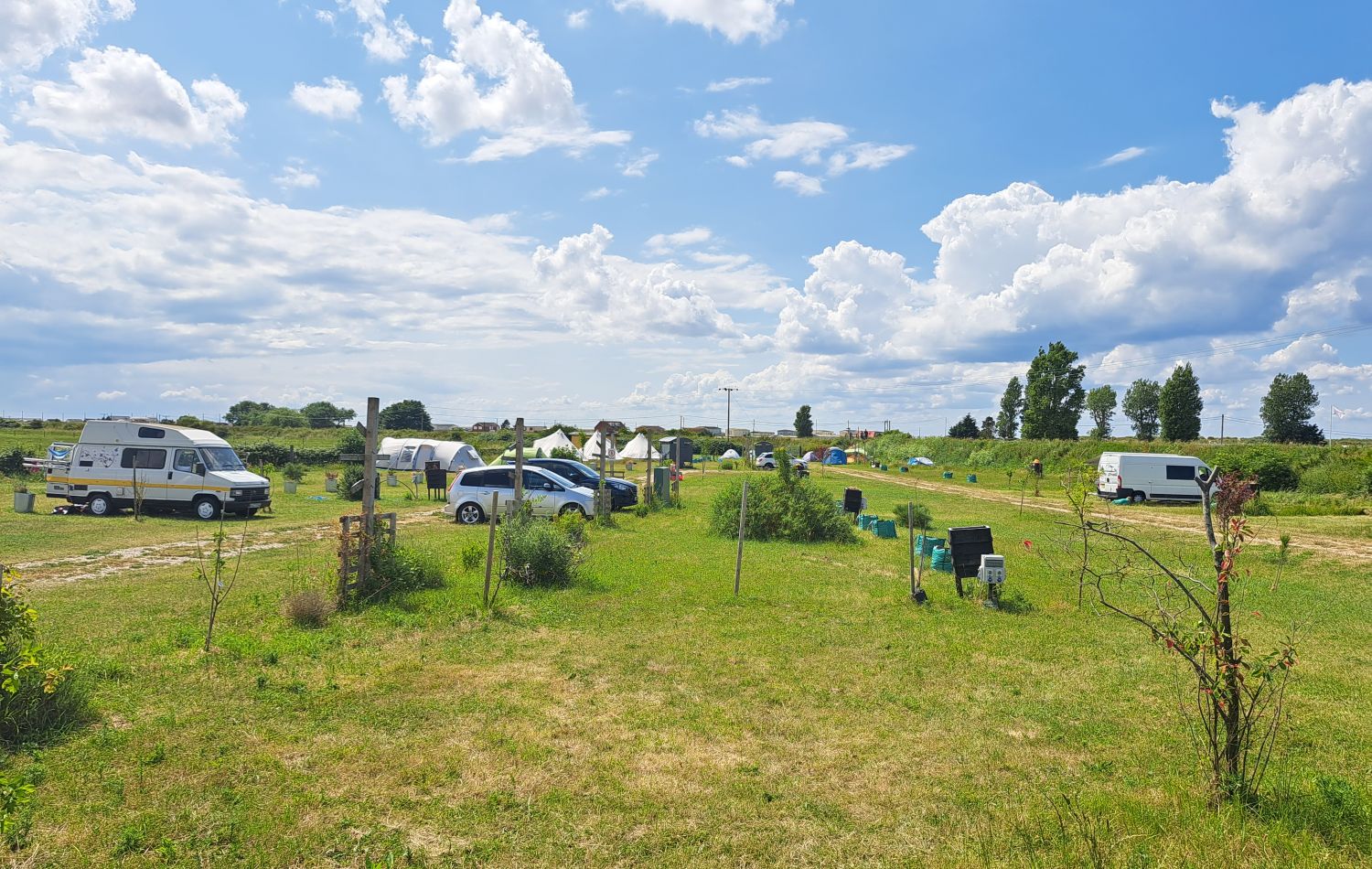
I've done my utmost these past 5 years to protect the ecology of this site
2nd Criminal Enforcement
August 2022 - I received documentation to advise I’d be taken back to criminal court based on the operation of the site and failure to report on the infrastructure.
As the letter on the right suggests, I struggled time-and-time-again to get in contact with the appropriate bodies and discuss what was expected of me and an appropriate way forward.
I made many attempts with the goal of sorting out what I needed to do to operate the site lawfully.
In return, I was accused of criminal prosecution for which I intend to plead Not Guilty.

A response to discussions on criminal enforcement
LPA fail/refuse to enter into communications
After going to court, talking with the council’s legal advisor, and going through the case step-by-step, the council still entered into no communications, and there were no negotiations on points to whittle down issues to get to one clear issue or action.
Their only focus is to take me to court to condemn me for failing to comply with every point of their unclear enforcement notice.
I’m now waiting for the next hearing on July 8th where I need to put my plea in of not guilty and try to get the magistrate to understand the points I raise. Unfortunately, magistrates assume that the police and local authorities know what they’re talking about. Magistrates aren’t legally trained, and therefore rightly feel they should rely on views, opinions, and guidance from individuals who are thought to be experts in the subject matter.
My experience is that they are not, magistrates need to be prepared to listen and understand the accused who, although isn’t legally trained, often becomes very knowledgeable of the legal status of the facts in question.
Nullity
Stephen Scown advises on the appropriate defence that the entire enforcement was a nullity. It was unclear and imprecise, and the points raised would stop the legal right of existing permitted development rights. My hope was that this would open communications between the two parties of my legal advisor and the council.
The letter from my advisor is on the right.
Unfortunately, no communications were exchanged and not even so much as proof of receipt of the letter was received. Nothing at all was heard until March 2023 when I get a new hearing to go back to court for operating a campsite and failure to demolish infrastructure based on the enforcement notice. I have meetings with enforcement consultants who, again, inform me this document is a nullity and should not be used in court to enforce against me as it’s inadequate, unclear, and wrong.

An example of what makes an enforcement a "nullity", AKA Waste Paper
Terry Parish and West Norfolk Council slanders local developer
Local developer registers Code of Conduct complaint against Councillor Terry Parish over defamation
Councillor Terry Parish, new West Norfolk Council Head, has had a complaint registered against him by local parish member Nigel Marsh
In a meeting about a planning application on my property, one councillor, Terry Parish, decided to make some choice comments. However, this wasn’t a comment on the application, it was instead an attack on me and my character.
During a planning hearing for a point of entry, Councillor Parish saw fit to slander me and my business, and to this day he has largely gotten away with it!
Councillor Terry Parish’s comments against me had nothing to do with the Planning Application. He objected to the planning application and used slander to manipulate the hearing and convince other councillors to side with him against me! With this, he managed to obtain conditions that the borough council and the highway authority both recommended against.
Condition: build a wall to stop campers from accessing the campsite
One of Councilor Parish’s proposed conditions was to build a wall to stop campers from getting to the campsite, a concept reminiscent of the Cold War and the building of the Iron Curtain!
This condition let me use the entry point, but only for the holiday lets and not the campsite it runs past, making it impossible to operate my business here. It would have required me to build a wall between the entrance and the campsite to prevent access between the two, making certain areas of the site entirely impossible to access!

Tell me where in this picture I could possibly build a wall to stop access to the campsite!?
Condition: The historic entry point can not be used for farming and campsite
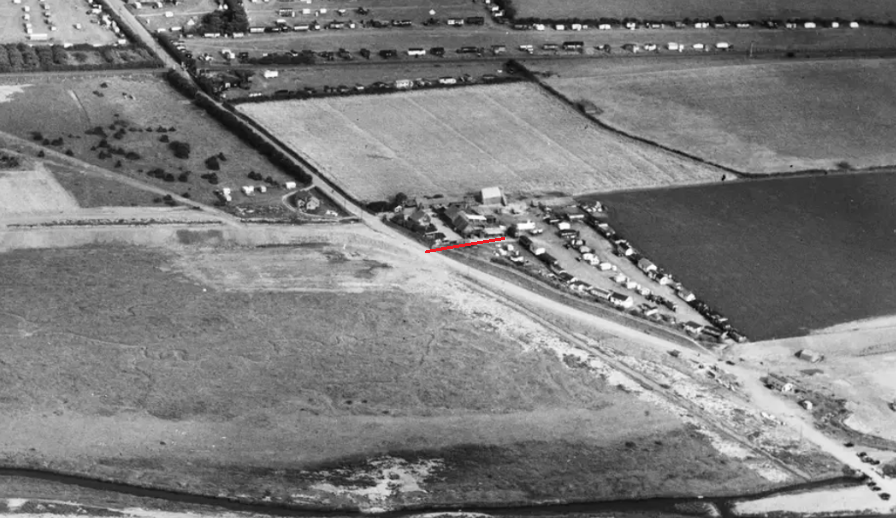
Our site on July 30th, 1953, with the point of entry highlighted
On top of an unreasonable condition to make large areas of my site effectively useless, the council also proposed a condition whereby only holiday let guests could use an entry point! Not only would this condition have been nearly impossible to enforce, but it also entirely ignores the fact that this access point has been accepted since at least 1953 when it was pictured in use as an entrance point for the caravan and campsite which was operating at the time. Regardless of that, the planning hearing still sketched a plan to get it approved!!!!
Councillor Parish manipulates reasons to add conditions
I believe the slander of both my personality and my business influenced the decision-making of the planning process.
The planning process should be objective decisions made to ensure sustainable economic development, a better environment, and improved local infrastructure. Not only is this an attack against me, but it flies in the face of the expected process of council and democracy as a whole!
At this stage, Terry Parish was only a parish councillor, and as a parish councillor or councillor of a borough council there is a code of conduct he should abide by - here are the important highlighted parts relevant to it.
Now, his conduct has wound up making Terry Parish the centre of attention in an article by the Eastern Daily Press; he wasn’t head of the council for long but he certainly caused trouble!
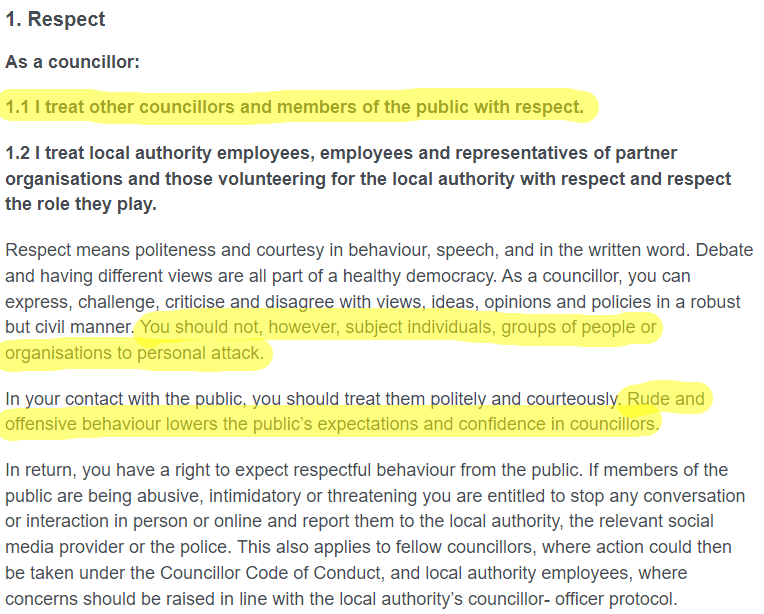
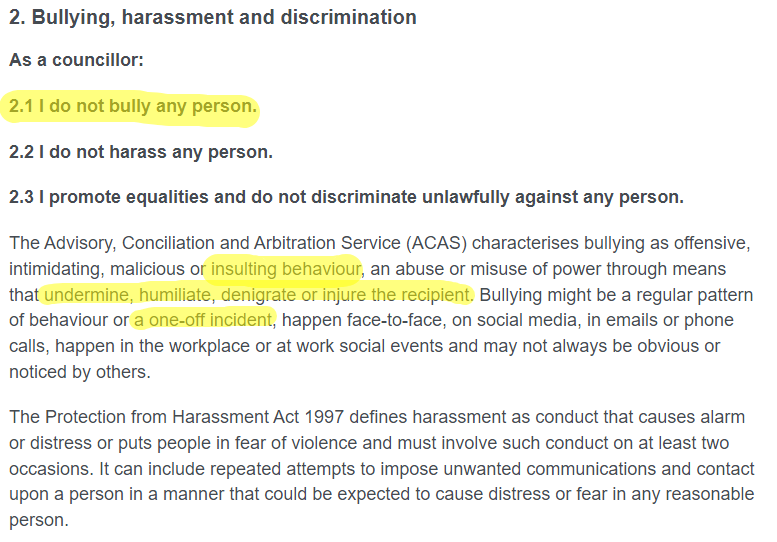
My submission to the monitoring officer of councillors expected me to pull up the councillor, guide them on misgiving, and guide them on how to communicate with the public or, indeed, communicate with anybody. My complaint was clear, I was complaining against slander, libel, unprofessional behaviour, and defamation. The evidence I submitted showed this video with Terry Parish going on to say various things, including:
- Calling me a "rogue developer" that is “causing multiple problems to this and other planning authorities"
- Saying that I’m “known to ignore or abuse planning rules” and that they should find a way to get me to "close the campsite permanently”
- Calling my site a "joke" and an “illegal campsite”
- Saying that the site is “usually full of cars and campervans and God knows what else that shouldn’t be there.”
Watch the video on the right to see the planning meeting and hear councillor Parish's comments, as well as my reaction to them.
With this allegation and this evidence, it is clear to any person on the Clapham Omnibus that I, Nigel Marsh, was quoted by Councillor Terry Parish as a “rogue developer”.
There is no evidence that this is factual, nor is there evidence that this is someone else's opinion that Parish was relaying on behalf of someone else; this can only be his view, and as such it's clear slander. Similarly, the minutes of multiple Council meetings from April 2022 to January 2023 refer to my campsite in a libellous manner as an "illegal campsite"
You can read the email I sent off personally on May 9th to complain about Parish's conduct on the right here.

This is just one of many times my site is unfairly referred to as an "illegal campsite" in Council Minutes.
You can read the full Minutes for April 2022, July 2022, August 2022, December 2022, and January 2023

A complaint ignored
Of course, I submitted a complaint on Councillor Parish's misconduct, looking to get him to retract his slanderous statements and get an apology for the defamation of my character in a public meeting where he had no reason nor grounds to attack me and my campsite since neither of these was under discussion. The point of the planning meeting was to discuss an entry point for holiday lets, and Mr Parish turned it into a soapbox on me and my other, unrelated businesses in order to further his own agenda.
You can read the full complaint on the right.
So, how did the council respond to this valid summation of Terry's comments and complaint against the character assassination levied against me by the councillor?
They dismissed it, of course!
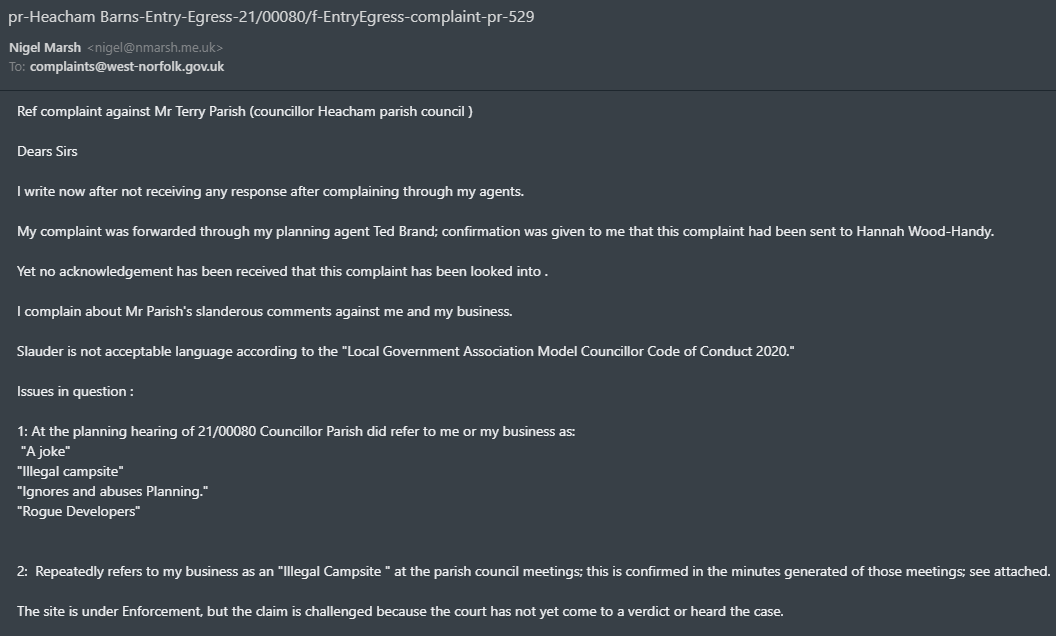
The council looked at my complaint and instead of, again, focusing on the details of my complaint and responding to them, they instead shot off in different directions, justifying why Councillor Parish saw fit to defame me publically instead of perhaps reviewing the language he used and whether he should treat members of the parish like that.
Councillor Parish also uses a number of resolved cases to justify me as a rogue developer. I ask you, how do multiple examples of me fixing things at the request of the council make me a rogue developer?
And then, there's the assessment of the "independent person":
"Whilst the language used is less than perfect, considering the history of Mr Marsh’s noncompliance with regulatory matters, it is of little surprise that individuals at the council have expressed their views in this way – they are only human!"
Yes, they are only human, but they are also councillors! If a cashier snapped and berated you for being unreasonable, would you accept their manager coming along and saying "They are only human"? If someone started kicking off at an officer of the law for an unfair arrest, would they avoid charges because "They are only human"? In a court of law, would someone speaking their mind avoid contempt of court because "They are only human"? Why are the local authorities held to a lower standard of responsibility than the constituents they claim to represent? Aren't they meant to be level-headed officials making objective, reasonable decisions?
At the very least, Councillor Parish needs re-training and to retract his statements. The management officer suggests that if I want to take it further I should appoint a solicitor. However, Councillor Parish represents the council and is the head of the West Norfolk District Council. As such, it's not just a councillor that's gone out of line: this councillor's comments are comments representing the council, and either the council has allowed this language to be used or encourages this language to be used.
As such, I have now complained to the LGA. The LGA, or Local Government Association, are an external monitoring system for local govt to be pulled up when their representatives act outside the code of conduct that they should follow.
Of course, it is entirely possible that Councillor Parish will hide behind "Qualified Privilege", something that allows Councillors to make slanderous statements in the interest of being able to "speak their minds freely" as Lord Denning stated in 1975. But this just leads back to the point: Why are councillors allowed freedoms and protection from defaming others that their constituents don't get?
The Secretary of State’s Planning Inspectorate has scathing review of West Norfolk's planning practice for mYminiBreak.
However, all was not lost. Following a review by the planning inspectorate, these conditions were overturned, and my plans were allowed to go ahead. A report from an Inspector appointed by the Secretary of State laid out their reasoning for this decision, which categorically reflected my arguments and sided with me wholly on the matter.
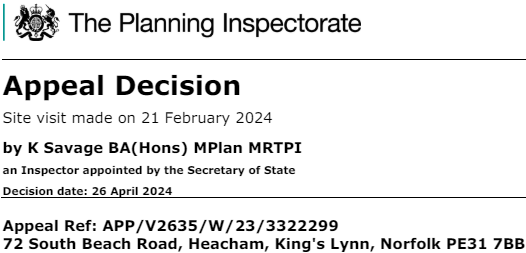
In the report, the Inspector of the Secretary of State writes:

Clearly, the Planning Inspectorate saw as well as I did that there was no legitimate reason to block this access based on this application. But, that wasn’t all, as they later stated:

So, there it is! The Planning Inspectorate appointed by the Secretary of State says that the use of the land is entirely unrelated to the focus of this planning application. I, of course, went to great pains to try and tell the council this, only for it to fall on deaf ears and myself to be branded as a “rogue developer”, a slanderous statement that the council upheld, citing my alleged “noncompliance” as the reason for letting blatant defamation stand in a council setting.
Well, the Planning Inspectorate certainly doesn’t think I’m not complying, and if that’s the case, what grounds do the council have to allow this slander?
You can read The Planning Inspectorate's full report here to see just how supportive they are of like-minded business owners!
With the Planning Inspectorate’s opinion that the council acted inappropriately and confirmation that I acted fully lawfully, I will be submitting a new complaint with a view of putting it in front of the ombudsman if the complaint is ignored, or the council advise that an elected member of the West Norfolk Council representing the council can slander an individual in this manner!
Grainstore restricted from Hotel usage, despite legislation allowing it
The Grainstore
What else would I use a grainstore for?
- 2018 - Holiday Homes
- 2020 - Class R Usage
- 2021 - Toilets & Showers
- 2022 - Residential Usage
- 2023 - Shifting Goalposts
- A Late Decision
- Chasing for a refund
I thought the government wants to encourage agricultural buildings to be used for other uses in particular turned into business residential tourist facilities. I own an agricultural building stuck in the middle of my campsite and holiday site. It’s no longer viable to keep a herd of cattle. I don't need a shed of chicken feed, and I haven't got a tractor, so why not utilise the 2015 general permitted development order act which gives permitted development for such a building to be changed and utilised for several uses under Class R?
As I understand it, and as I've been advised of it, under 150 square metres change of use can be done without anybody's consent, if I got an agricultural building and want to put a shop in there, then so long as it's under 150 sq/m I can do so without having to go through forms, applications, consent, or any other bureaucracy before implementation. If it's over 150 sq/m but under 500 sq/m, I need to go to the local authorities for their consent or approval where they have 56 days to yay or nay.
Conditions of approval have nothing to do with what the local parish council or local documents say, we just need to tick the boxes of The General Permitted Development Order Act of 2015 with these conditions:
- transport and highways impacts of the development are mitigated;
- noise impacts of the development are mitigated;
- There are no contamination risks on the site; and
- There are no flooding risks on the site,
If these boxes are ticked, the council HAVE TO approve. For it NOT to be approved would be unlawful, and the council would be acting unlawfully, unreasonably, and restricting my legal rights of using my building as per the law allows.
Now I ask, would the council act unlawfully?
And I answer: too right they would.
Because they have.
Do I have evidence of this?
Yes, I do.
Who can be held responsible? It seems nobody. It seems that, regardless of whether there is a rogue planning officer or a rogue controlling influencer telling planning officers what decisions they should make, none of these can be held responsible. Our only option is to spend more money on appeals to argue our point and get the decision we're lawfully entitled to. And yet, none of these individuals are held responsible for their errors! Surely it can't be an error if done intentionally, either they're appallingly ill-informed or they are manipulating lawful rights with the aim of creating confusion to justify an unlawful decision.

The grainstore and toilet block in 2016: old, dilapidated, and not in use

The grainstore and toilet block as they stand today. They look much better, don't they?
2018 - Application for Holiday Homes
Once I had purchased the site and its buildings in 2016, I then made the decision to run a tourist destination considering its prime location and prior agricultural use. I first started looking into how to convert the Grainstore into a building for holiday home usage.
I submitted an application in 2018 for a proposed change of use to existing agricultural buildings to holiday home use at Beach Farm on Beach Road in Heacham. However, this application didn't go far as, at the time, I was inexperienced and not as knowledgeable as I am now regarding my options in change of use. Combine this with a cavalcade of more pressing legal matters and not knowing how to move forward with the idea, I decided to withdraw the application and focus my efforts elsewhere.

This draft application from 2016 shows how early I wanted to adapt the Grainstore
2020 - Application for Class R use
By this point, I had become quite knowledgeable about the General Permitted Development Order Act of 2015, and so submitted for prior approval for the Grainstore to be used as a dwelling house under Class R. The submission for this kept to an area over 40 sq/m and under 150 sq/m that was used for Agricultural use 10 years prior. According to the fourth edition of Martin Goodall's A Practical Guide to Permitted Change of Use, this makes it eligible to be changed to Class R usage which, among other things, includes Hotels.
So, I submitted the application, believing that the Grainstore more than fit the requirements of Class R usage.
The application was refused on 3 points.
1. The use of the building does not comply with Class Q.1 (a) Part 3 of Schedule 2 of the Town and Country Planning (General Permitted Development) Order 2015 (as amended) insofar as the site is not used solely for an agricultural use as part of an established agricultural unit.
2. Insufficient information has been provided to demonstrate that the works to achieve the conversion satisfy the requirements of Class Q.1 (i) Part 3 of Schedule 2 of the Town and Country Planning (General Permitted Development) Order 2015 (as amended) in regard to structural changes
3. Insufficient information has been provided to determine whether, as a result of the proposed change of use, taking into account any proposed mitigation, the site will be contaminated land as described in Part 2A of the Environmental Protection Act 1990(9), and in doing so have regard to the Contaminated Land Statutory Guidance issued by the Secretary of State for the Environment, Food and Rural Affairs in April 2012(10). This does not meet the procedural requirements of W(10)(c) of Class Q, Part 3 of Schedule 2 of the Town and Country Planning (General Permitted Development) Order 2015 (as amended).
2021 - Toilets & Showers
Based on the findings of the 2020 prior approval application and subsequent refusal, I looked to use 40 sq/m of the Grainstore as toilets and showers for my lawful caravan and camping site. I submitted an application to the council for their acknowledgement and approval, knowing my usage was 100% lawful under The General Permitted Development Order Act of 2015 - by utilising 40 sq/m of the Grainstore for leisure.
The leisure use was showering and toileting facilities after a day at the beach. In the planning officer's report after the decision, Chris Fry (Planning Officer) quite rightly asked the council’s internal legal department for the rights to the legal use of this building as described. The internal legal department replied to Mr Fry that the usage as described IS lawful and as long as the Grainstore in question was used for agricultural use in 2012, it doesn't matter what the building was used for between 2012 to 2021 - the use as described in the application would be lawful use:
"For the purposes of the GPDO I do not believe that it matters whether the use of any adjoining planning units is lawful or not. The principal determining issue is whether the building was used solely for an agricultural use as part of an established agricultural unit on 3 July 2012. If so, then its use can change in accordance with the Class R criteria."
Despite this advice, Mr Fry entered into a decision on the application as refused, alleging its connection with an enforcement order of 2019 regarding a permanent campsite restricted this application for approval. This is despite any context or explanation in detail as to this alleged connection.

The legal opinion is that the priority of this application is whether the building was in agricultural use in 2012 - an opinion haughtily ignored by Mr. Fry
2022 - Entire Grainstore for Residential Usage
Following this refusal, I further applied on 4 different occasions regarding the change of the entire Grainstore to Residential use. Since it is over 150 sq/m but under 500 sq/m, I did need to apply for planning permission, but it is still permitted under Class R. I've obtained items back for rejection and admittedly need to do more research, since these refusal letters often need a spyglass and fine tooth comb to understand what the council thinks you did wrong.
Throughout the discussions on these applications, I have:
- Supplied a contamination report to show there's no contamination on site
- Supplied a Habitat Regulation Assessment and Shadow Habitat Regulation Assessment that was amended based on Natural England's required updates
- Requested a permit for a septic tank system as per Natural England's request
- Undertaken an ecology report to ensure there are no endangered habitats on-site
- Made a payment to the GIRAMS to mitigate any potential damage to wildlife
2023 - Contesting 2022 Refusal and Shifting Goalposts
The final application 2023 settled without any doubt the fact that we are in a flood risk 1 zone, not in a 2 or 3 zone. The Environment Agency updated their info based on the topographical evidence I supplied and confirmed that we are not in a flood risk zone. In fact, they changed their modelling and showed that we are not in a high-risk overtopping site.
This time after lots of confusion and email back and forth, the refusal arrived to state that because the Grainstore was used for something other than agricultural use in 2021, I now need to wait a further 10 years before reapplying. This is now completely contradictory to the legislation documented in the General Permitted Development Order Act of 2015 and entirely in opposition to Chris Fry's statement seen in the image to the right as well as the legal advice shown in this image.
Now, of course, back in 2021 we removed the toilets as they were refused to be used in conjunction with the Grainstore. However, they're now saying that the Grainstore wasn't a Grainstore in 2021. So, I ask, what on earth is it, then? If you put a disabled toilet into a train station, does the entire station become a toilet that trains pass through? Does putting toilet stalls in a restaurant make it one giant bathroom that serves food? How is the council allowed to call things on my site different things to achieve their goals?
The reason ignored in their decision is such a basic cornerstone of the agricultural building pre-approval scheme that the average schoolboy with an interest in structural planning is aware of the condition that if a building was in agricultural use in 2012, its usage can be transferred to any number of uses under Class R.

According to Mr Fry's report, the Grainstore is permitted by Class R and complies with all the relevant points.
This leads me to believe one of three things.
- Either planning officers are woefully ill-informed and untrained;
- the council is so understaffed because they've failed every recruitment drive that they have had to resort to getting work experience from the local primary school; or
- a decision is made from above (The Muppet Master) to refuse, leaving the so-called planning officer to dream up the reasons that allow for the decision to be made public.
Is this any way for local government to operate?
Their priority should be in serving their community, both business and consumers. The tourist industry is an important one for Norfolk and one that needs development. Of course, it should be developed carefully to ensure the delicate balance of beauty in nature is undisturbed.
But commerce, creating jobs, and contributions to local taxation are important needs that tourism provides and we could provide far more effectively if we weren’t hindered at every half-step. In fact, it would all progress far more smoothly if the council actually helped us understand what we need to do and how to do it instead of leaving us to stab in the dark until we get it wrong.
As far as the planning legislation dictates, every planning app should be looked at positively from an unbiased viewpoint.
"Holders of public office must act and take decisions impartially, fairly and on merit, using the best evidence and without discrimination or bias"
“Planning issues must be assessed fairly and on their planning merits, even when there is a predisposition in favour of one side of the argument or the other. Avoiding predetermination and the impression of it is essential. The decision making process must be seen to be fair and impartial from the perspective of an external observer.”- Probity in Planning, December 2019
A late decision
Of course, there's more to the refusal than the foolish decision above.
See, this application for a change to Class R use was received on the 22nd of March 2023. The refusal came on the 8th of June.
Under the 2015 General Permitted Development Order Act, authorities must notify an applicant of their decision within 56 days of receiving the application. Given the timescale laid out above, the council didn't respond for 78 days, far beyond the permitted time zone of 56 days, which effectively defaults the application and gives me development permission.
Moreover, the council charged me more than double what they should have for an application for Class R usage. The standard fee for this application is £96, however after I handed the application in, I was told I needed to pay an extra £110 on March 27th. I wasn't told why I had to pay this extra at the time, and it doesn't change the fact that I submitted the application and paid the correct fee on the 22nd of March. In later research, I learned that a fee of £206 is when building operations are proposed alongside change of use, however I didn't propose any building operations, so this was an error on the authority's part.
And, thanks to all the council's errors, I see no reason that I cannot start development, and as such will be starting work on it now.
Of course, in the interest of being fair and lawful, I have still submitted an appeal for this condition. You can read the full appeal and appendices to the side, as well as a Shadow Habitat Regulation report carried out in May of this year to show the mitigated impact on the local ecology below:
Chasing for a refund
So, the season of 2023 passed; the busy summer period where tourists are looking for places to stay and I try to provide a good one. Once it did, I could re-focus and look into chasing the refund for the money the council requested for no reason. I applied for a refund for the £110 that was wrongfully charged for "operational development", looking back through documents to support my case that I didn't apply for any extra development work that would incur the extra expenses I was charged of. refusal
And in going through the documents, I found the initial refusal, and in it found something very interesting:
Prior Approval is sought for the change of use from an agricultural building to a hotel.
No operational development is permitted by such an approval.
This begs a very pertinent question: if operational development isn't permitted by this prior approval, why was I charged for it? Both the council and I know that operational development is not permitted by a change of use to a hotel, so why would they expect an extra charge that wasn't applied for and wouldn't be allowed anyway?
This only further damns the council, not just in me being entitled to a refund, but also in their late reply, 78 days after I paid the correct amount. Their defence is that the application didn't really start until I paid the full amount, but if I didn't apply for operational development, and operational development isn't permitted regardless, why did they expect me to pay this amount in the first place?

You'd think the council wouldn't want to give themselves more work, but I suppose putting Mr Marsh's plans on hold is simply too important to them!
No legal point of entry to site allowed by council
No Entry Point for Holiday Lets
Agricultural Buildings - Planning Approval
- Auction & Conveyancing
- Enforcement
- New Planning Application
- Addition: New Point of Entry
- Appeal for Point of Entry/Exit
- Request of & Appeal for Minor Amendment
I’m very commercially minded and can act very impulsively on what I perceive as an economic good deal. I am eager to jump in with both feet, embracing the challenge of learning new skills and making nothing into something that I perceive is achievable.
Auction & Conveyancing
In 2016, an old dilapidated farm building came on the market to be auctioned off to the highest bidder. Of course, I advised my wife fully of my plans (not), and I made my excuses to pop into the neighbouring market town to purchase some wallpaper. In truth, my intentions were to go to the auction and bid for a property I had no finances for and couldn’t afford. To my surprise - subject to a £10,000 deposit - I successfully won the bid.
Money was tight, so I undertook conveyancing myself. I had no option to change any details in the auction and had already committed myself to the deal - I had to have as it stands, there was no room for negotiation, it is as it is when the hammer falls.
It was a great 12 months, rolling up my sleeves, taking part in building work, digging work, living in a caravan, taking a dip in the sea when work became too exhausting. However, this was a short-lived holiday. The real work began when the final touches of development started to take place, ready for the first guests.
Click the images to see the full versions
Enforcement
One sunny Thursday morning, an enforcement officer turns up and advises me cautiously that it's unlawful for me to operate my new holiday lets, as a condition of them is the customers must enter holiday lets via Entry Point A.
As Entry Point A wasn’t sold to me at auction, it would be unlawful for the holiday lets to operate as it would be unlawful for my customers to invade someone else’s property to access. Despite saying I have Entry Point B where people can enter the property, the planning consent says customers must enter through Entry Point A.
This was a bad day.
This was also bad information and something which I didn’t quite know at this stage how to get around.
The visit was followed by an email confirming the discussion, and 3-4 months later I received an enforcement notification advising I was in breach of certain conditions of planning consent. Despite the enforcement notice advising I should cease all operations, I did continue development as I believed this could all be worked around, so long as all parties worked together to resolve it.
To my surprise, all parties were not interested in working together to resolve it.

Entry Access Point B to our site

The enforcement notice I received from the council.
Click the image to see the full notice.
New Planning Application
After talking to many different people regarding the situation, it seemed to me the easiest solution with my minimal cash flow was that I should reapply for new planning consent. This planning application was, largely speaking, based on the previous approval in 2012, with the exception of using Point B as an entry point instead of Point A. I was aware there were some minor changes to be made to Point B:
One arrangement was with the Environment Agency to change their flood risk sign so it didn't cause a visibility hazard when exiting the property;
The other was convincing our neighbour to move their fence back to the boundary line at the end of the grass line instead of on the highway.
We achieved both of these and my appeal for a new planning application was submitted… at the cost of roughly £2500 plus consultancy fees.
Unfortunately, this application was refused due to new policies which now cover the area. No exception was made by local planning officers given that this was an application to solve an existing problem rather than an application for a new development. This was still the same application as the 2012 one that got approval.
Trying to get advice from planning officers was difficult; the reasons for the refusal seemed illogical and there was no mechanism to add another point of entry to the original application. It was less a case of the officials helping me to run a lawful hotel or holiday home, and more one of me clawing in the dark until I either did it right or hit another enforcement notice.
Looking back, if they approved the application, I would have also been responsible for the Community Infrastructure Levy (CIL) which would have cost me roughly an extra £30,000 on top of the £2,500 I had already paid. The planning officer maybe should’ve considered this easy boost in funding, given the fact that approving the application would have brought an extra thirty grand into the local authorities' purse for additional infrastructure. Something that I think the local parishes and county councils should consider more, as additional infrastructure is important for communities, especially the local ones that are lacking so much in services and facilities.

The CIL goes towards the improvement and upkeep of infrastructure. This includes schools, roads (which includes potholes), mobile communications, and much, much more.

This report from 2012 proves that the site and its buildings were in agricultural use in 2012
Also looking back, I now know that as the agricultural building was in agricultural use in 2012 and I can’t help questioning myself as to why I submitted a new planning app for £2500.
For £250, I could’ve submitted a pre-approval and obtained it through permitted development (subject to solving the flood risk factor).
I found the local authorities wholly unhelpful in resolving the situation or even letting me know what it was they wanted to be done. Because of this was facing the prospect of demolishing the substantial development I’d already finished; returning the holiday homes to dilapidated barns or cowsheds as progression seemed unachievable.
Addition: New Point of Entry/Exit
After many months spent in limbo, looking for a way forward, I eventually hit a realisation and frustratingly don’t understand why I didn’t realise this earlier: I could actually apply to Planning Consent for a new entry point, specifically for a holiday let and then Planning Consent could quote that this entry is for a holiday let. With the planning consent being granted for that particular use, I could apply for the condition to be removed as the condition is no longer relevant since permission has already been given for particular access. This was my theory, and my studies seemed to confirm that this was practical and possible as there were not many planning policies that need to be honoured/agreed to in a simple track for vehicles to enter over, park on and turn around in.
In 2021, I submitted the application.
18 months, 5 different planning officers, and 1 planning hearing later, I finally got my approval.
But, of course, they didn’t approve it before first adding an extra condition that this driveway could only be used for my holiday lets.
Despite the planning officer saying this couldn’t be enforceable, they eventually gave way to limit the access point by adding a condition that this driveway could only be used by residents of the holiday lets.
While at the hearing, I felt that the local parish councillor, Terry Parish, didn’t act like a public servant at all. He saw fit to slander my name, quoting that I run an “illegal campsite”, I’m a “rogue developer”, my site is a "joke", and that I am “known to ignore or abuse planning rules”. These are untrue, slanderous comments with the intention of damaging my reputation and the reputation of my business in the eyes of the council. See my comments on the council meeting here:
I, of course, entered into complaints procedures regarding his conduct. As a parish councillor, it’s his job to act on behalf of both customers and businesses, and he should hear my point of view as well as the residents' point of view. Even in this case where the council was in agreement with the development and there were no public objections to the development.
And how did the council respond to this complaint?
They dismissed it out of hand, saying that "Whilst the language used is less than perfect", "it is of little surprise that individuals at the council have expressed their views in this way – they are only human!"
Now, as a campsite owner, I have to watch what I say intently while interacting with guests, much like a cashier, waiter, or any other customer service worker. If, when faced with a particularly tough customer, I resorted to language like that used against me by Councillor Parish I would, at best, get a poor review that has the chance to damage the business and at worst, get a complaint sent straight to the council. If a customer service worker did the same, they would get reprimanded or even fired for their misconduct.
So I ask, why are Customer Service staff, minimum wage workers who assist the public, and anyone else who interfaces with people in any capacity held to a higher standard than the Councillors who are meant to have the public's best interests at heart?
The Local Government Association's Councillor's Code of Conduct 2020 outlines how a Councillor ought to act. Calling me a "rogue developer" and a "joke" is clearly a lack of respect in breach of point 1.1, and all the comments are attempts to undermine and humiliate me, which is a breach of point 2.
Appeal for Point of Entry/Exit
So, I finally received the approval with the relevant conditions, however now have to appeal the condition that it can only be used for the Holiday Lets.
The development was a retrospective application, which means the road gate with the correct access width was already in place and all development had already been undertaken. With the appeal, Norfolk Highways put in a condition for a standard width to be implemented, high visibility splays at the exit, water on the cars disposed of before hitting the highway, and other standards. They gave us 3 months to complete this work. After 3 months, to my surprise, an enforcement officer was back on my doorstep to enforce against conditions of Norfolk Highways not being completed.
They seemed to believe the entrance was not at least 5 metres wide as confirmed as a condition, and as such are chasing us regarding a failure to undertake work on it.
The thing is, it’s over 6 metres wide.
That’s the first order of the conditions but there was no work to undertake as we were already compliant. It was a retrospective application as the work was already done before submitting the application. The enforcement officer failed to explain what it is I failed to do and progressed to enforce against me. By enforcing against me, they potentially stand to make this access unusable and therefore my holiday lets unlawful. I have, of course, appealed against this. See images for full details of the appeal.
-
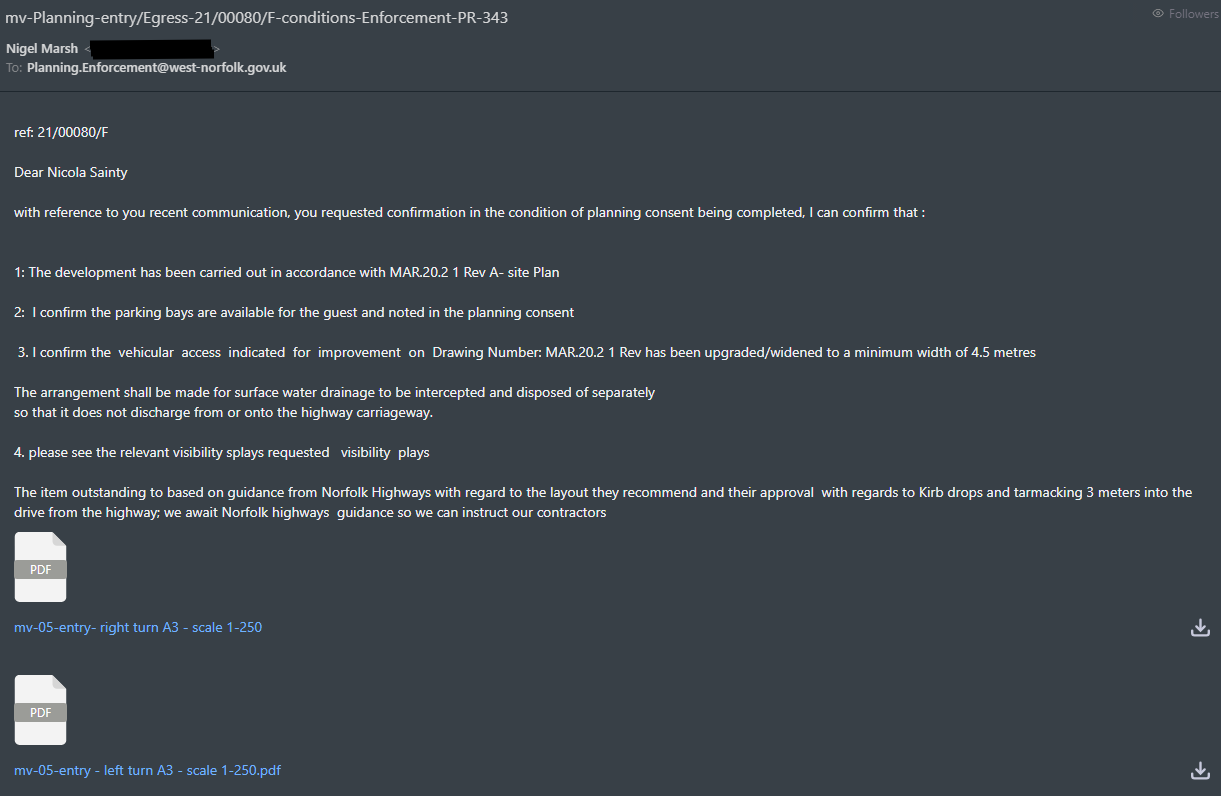
Email 1
-

mv-05-entry - left turn A3 - scale 1-250
-

mv-05-entry - left turn A3 - scale 1-250
-
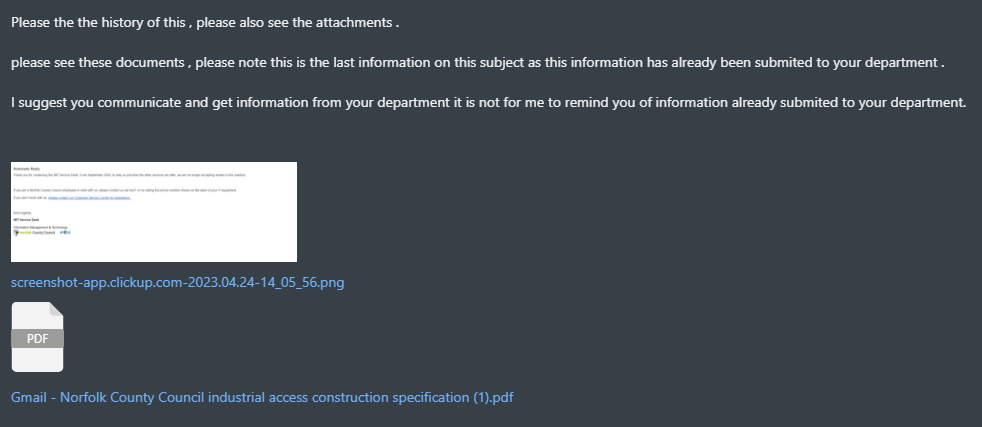
Email 2
-
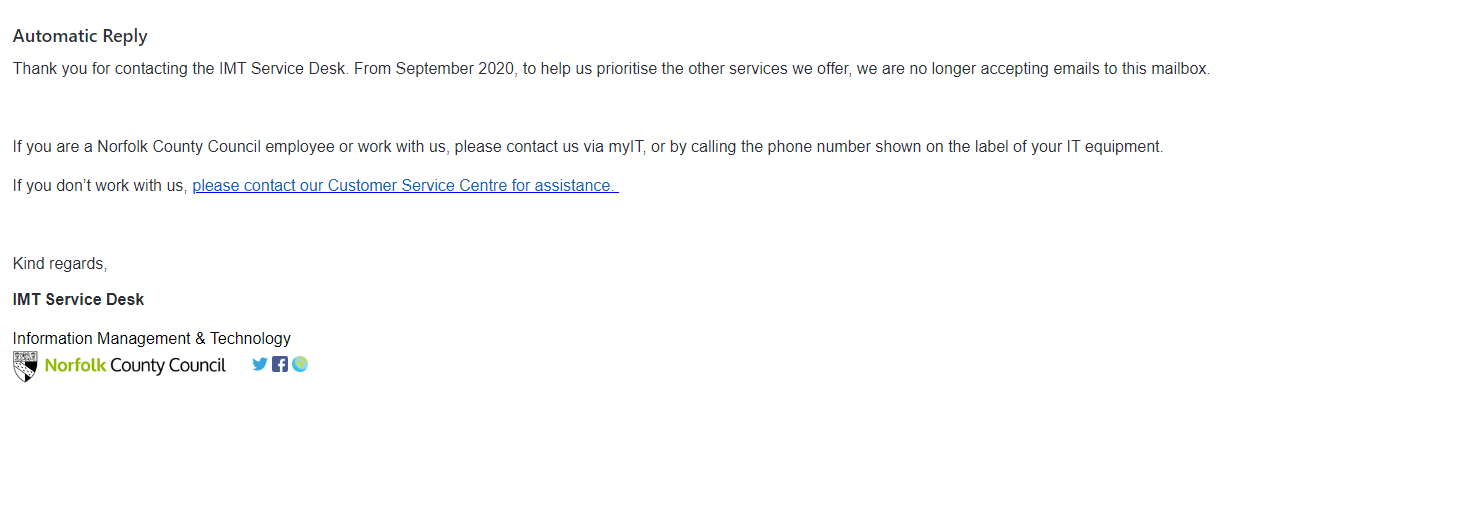
Govt Receipt of Liaison
-

Gmail - Norfolk County Council industrial access construction specification
-
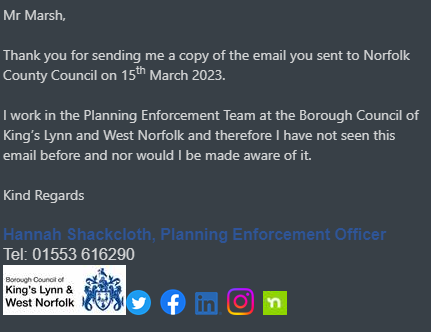
Email 3
-
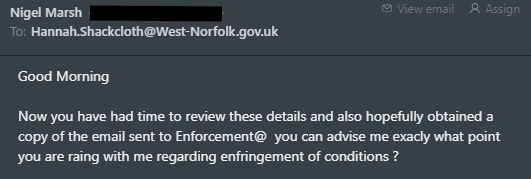
Email 4
Request of & Appeal for Minor Amendment
Meanwhile, under another enforcement, the officers come and inspect the final Holiday Let I completed and state that the windows and doors aren’t as expected or say on plans. As such, I need to change them and apply for a planning application on that change. At this point, thanks to the barrage of planning applications I’ve had to fill out, I’m becoming quite knowledgeable and know that the full planning process isn’t needed, I just need a minor amendment to the original plan. The minor amendment needed to show the windows and doors in a slightly different location. I just needed to apply under a minor amendment, and so I did.
For some reason, the LPA then decided not to evaluate the minor amendment but instead evaluated the application as a new residential use with the potential for having more guests than the planning consent allowed for. This, unsurprisingly, left me completely dumbstruck; you ask the local planning authorities to judge on one issue and instead of that, they decide to judge on a different question you haven’t raised, wasn’t expected or asked to raise, and as such wasn’t in the application form and you haven’t submitted details on. That's like if I entered my young female labrador Bramble into Crufts and find out she was rejected because they judged her on being a Bulldog!
This cannot be right.

Bramble is a good girl, but it'd be unfair to judge her as anything other than a Labrador!
As a result of bringing in an entirely separate and heretofore unmentioned issue, they refused the application and as such I, once again, had to appeal the application. See appeal overview here:
